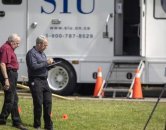Sharren Haskel: I am Israel's Canadian-born deputy foreign minister. Mark Carney is rewarding terrorist monsters
This week, the Toronto International Film Festival attempted to cancel, then reinstated, the screening of The Road Between Us: The Ultimate Rescue, a documentary on a retired Israeli general’s successful attempt to rescue his family during the October 7, 2023, terror attacks by Hamas.
The organizers of TIFF reportedly claimed they needed Hamas’s permission to show the footage of the extreme violence from October 7 found on the GoPros of Hamas terrorists.
How absurd.
The idea that a festival should seek “approval” from the very terrorists who carried out the murders, rapes, and kidnappings is beyond moral bankruptcy — it is collaboration in silencing the truth.
How this decision could have ever been contemplated in the freedom-loving, egalitarian, decent Canada in which I was born, is beyond me.
Canada has also decided to recognize a Palestinian state if certain predicates are met. But 50 of our hostages remain in Hamas’s dungeons of torture — starved, brutalized, some even forced to dig their own graves — yet the Government of Canada has chosen this moment, of all moments, to reward the monsters of October 7.
Ghazi Hamad, a senior Hamas terrorist, said it himself: Western recognition of a Palestinian state is “the fruits” of the slaughter on October 7. This is not a neutral diplomatic gesture. It is a direct political gift to a terrorist organization that butchered more Jews in a single day than at any time since the Holocaust. Canada is now helping to harvest the “fruits” of mass murder.
U.S. Secretary of State Marco Rubio has already warned that when French President Macron unilaterally recognized a Palestinian state earlier this year, it killed any realistic chance of securing a ceasefire and freeing the remaining hostages. Canada’s decision will have the same effect. It emboldens Hamas, hardens their demands, and sends the message that terrorism is not just tolerated — it is rewarded.
Let’s be absolutely clear: this decision changes nothing for the people of Gaza, nothing in Israel, and nothing for peace. The only thing it changes is the political fortunes of those in Ottawa who think a grand symbolic gesture will play well with certain domestic audiences.
And here’s the reality Ottawa refuses to see: support for the so-called two-state solution among Israelis has collapsed. A recent Pew Research Center poll, published in the Jerusalem Post, found only 21 per cent of Israelis now believe peaceful coexistence with a Palestinian state is possible — a 14-point drop in less than a year, and the lowest figure since polling began in 2013. Among Jewish Israelis, that number is just 16 per cent. The overwhelming majority of Israelis have concluded that after October 7, such an idea is not merely unrealistic — it is dangerous. Palestinian polling shows only 40 per cent support the concept of a two-state solution and that Hamas is overwhelmingly the most supported party.
The most popular candidate for president is Marwan Barghouti, who is in an Israeli prison on five counts of murder. Barghouti is not a member of Hamas but Fatah, but he is a terrorist too. Does Canada really want a Palestinian state on Israel’s doorstep led by terrorists like Barghouti?
This is not the Canada the world once knew. On Nov. 29, 1947, the United Nations General Assembly adopted the partition plan, ending the British Mandate and providing for the establishment of a Jewish state after two millennia in exile. Lester Pearson, then a senior Canadian diplomat and later prime minister, played a vital role in achieving the consensus that led to the plan’s adoption. Pearson maintained that any durable settlement in the region must include recognition of the Jewish people’s right to statehood in their historic homeland — a position he described as a “sine qua non” for peace.
For decades, Canada’s policy reflected that principle, contributing to its reputation as a constructive and balanced actor in the Middle East peace process. The current decision to unilaterally recognize a Palestinian state under certain predicates marks a significant departure from that long-standing approach. Prime Minister Mark Carney said earlier this year that any future Palestinian state should be “Zionist.” Whichever imaginary Palestinian state Mr. Carney believes he is declaring recognition of, it certainly won’t be “Zionist.” There is time for Mr. Carney to change his mind, and I would urge him to do so.
Canada says its recognition hinges on the Palestinian Authority agreeing to significant reforms: overhauling its governance, holding 2026 elections without Hamas, and creating a demilitarised Palestinian state. It is difficult to see how these predicates could be fully met in practice, given the entrenched power structures and ongoing influence of Hamas. It is impossible that all the predicates will be met by mid-September, so Canada would potentially be rewarding Hamas with state recognition before any of these terms can be met.
History will judge this decision in the context of Canada’s long-standing role in the Middle East. While Canada once acted as a constructive and respected partner in supporting peace and legitimacy in the region, this unilateral recognition risks undermining that legacy. Acting at a moment when our hostages remain in brutal Hamas captivity and tensions are extremely high, Canada sends a terrible signal that political symbolism and opportunism take precedence over practical and sensible diplomatic solutions, and that terrorism works.
I am pleased the Toronto International Film Festival changed their mind, but the antisemitism that is flooding Canada must be taken seriously by both the federal and provincial governments. Canada must do more to counter this terrible change in societal values since October 7.
Sharren Haskel was elected to the Knesset (Israeli Parliament) 10 years ago. She was appointed Deputy Foreign Minister in late 2024. She was born in Toronto and raised in Israel.


Comments
Be the first to comment